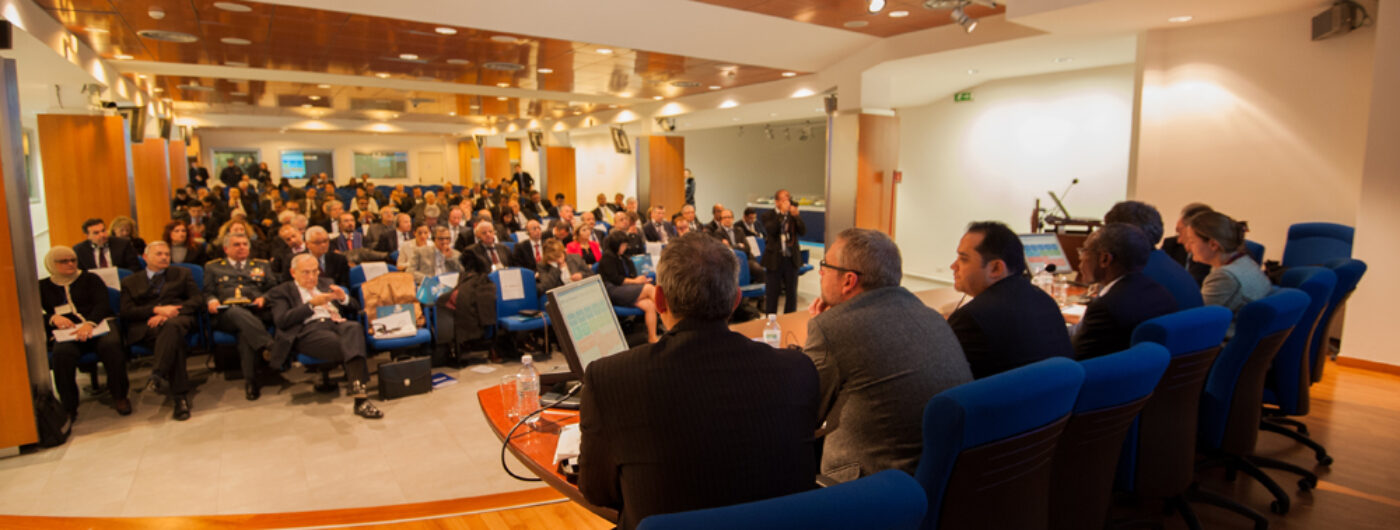
Euro-Mediterranean and international stakeholders give impetus to new funding strategy for transport projects in the Mediterranean region
Barcelona, 11 December 2014. The UfM High-Level Conference on the Financing of the Future Trans-Mediterranean Transport Network (TMN-T) successfully gathered over 120 participants before the Euro-Mediterranean Partners. The event was attended by the Minister of Transport of the Hashemite Kingdom of Jordan, H.E. Lina Shbeeb, in her capacity as Co-Chair of the UfM, as well as by the main European and international financial institutions, donors and private companies.
Held on 9 and 10 December 2014 in Civitavecchia Port (Rome), the Conference was a follow-up to the Declaration adopted in November 2013 at the UfM Ministerial Conference on Transport. The Ministers had stressed the importance of mobilising all available funds in a coordinated manner, and supported holding a conference involving all potential financial partners at the earliest convenience.
The event provided a suitable occasion for dialogue among project promoters, donors and beneficiaries to discuss how to mobilise and coordinate all potential partners towards the effective implementation of the TMN-T Network and its priority projects within the Trans-European Transport Network (TEN-T). Moreover, about 30 speakers participating in the conference proposed innovative instruments and alternative ways of funding with an emphasis on the role of the private sector.
The instruments available to facilitate the financial engineering of TMN-T projects through Technical Assistance, PPPs and other tools were analysed and emphasis was placed on the need to promote coordination among the different actors. The UfM Secretariat presented the current means of collaboration with IFIs to promote regional projects related to the future TMN-T.
UfM Secretary General Fathallah Sijilmassi reminded the attendees that “regional integration should be the underlying objective on any endeavour in the region, not only as a driver for economic growth, but also as the best guarantee for political stability. In this regard, the establishment of a Trans-Mediterranean Transport Network is key to achieve a uniform, harmonised Mediterranean transport system based on multimodality and elimination of regulatory impediments. The adoption, in the framework of the GTMO 5+5 Conference in Lisbon of October 22, of the core multimodal network of the Maghreb countries, is a decisive step in this direction”.
He also said: “specifically in the sector of transport, a closer coordination of the project-financing framework is needed. The UfM Secretariat is increasingly working as a catalyser of funding. In this regard, we are working on a permanent consultative platform gathering IFIs and all relevant stakeholders, through which a comprehensive and transparent discussion could be ensured, thus maximising benefits from existing financial instruments, including PPPs, funding mechanisms and instruments to reduce the financial risks”.
“A specific study will be launched by the Secretariat in the coming months with the aim to define the best methodology and procedures, the conditions for accessing funds and the most appropriate mechanisms to manage the specific funding programmes in the framework of a permanent platform for funding TMN-T”, added UfM Deputy Secretary General Ambassador Yigit Alpogan, in his speech.
The announcement to launch the aforementioned consultative platform to coordinate the European and international financial institutions building the construction of the financial framework of the flagship regional transport projects was welcomed by numerous financial institutions, such as IDB and EBRD, by the private sector as well as by the Presidency of the Transport Group of the Western Mediterranean (GTMO 5+5). This support would reinforce the efforts by the Secretariat to improve the instruments for project assessment and implementation.
Most importantly, the UfM High-Level Conference on the Financing of the Future Trans-Mediterranean Transport Network (TMN-T) represents the first milestone for the definition of its future funding strategy.
The event was co-organised by the UfM Secretariat and the UfM Co-Presidency (namely, the European Commission and the Hashemite Kingdom of Jordan) and was hosted by the Italian government in the framework of the Italian Presidency of the Council of the EU.

